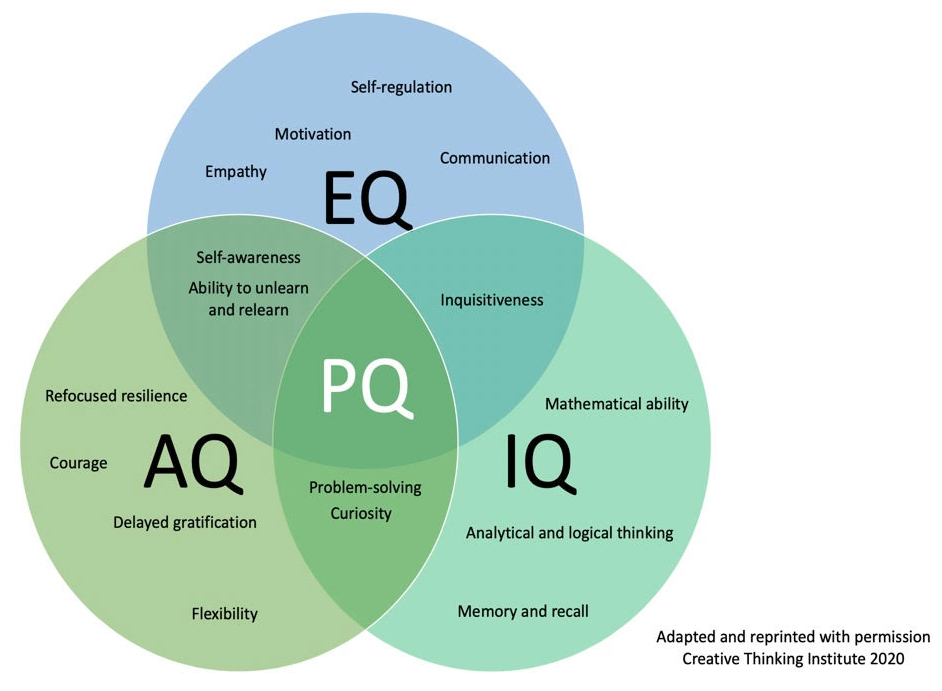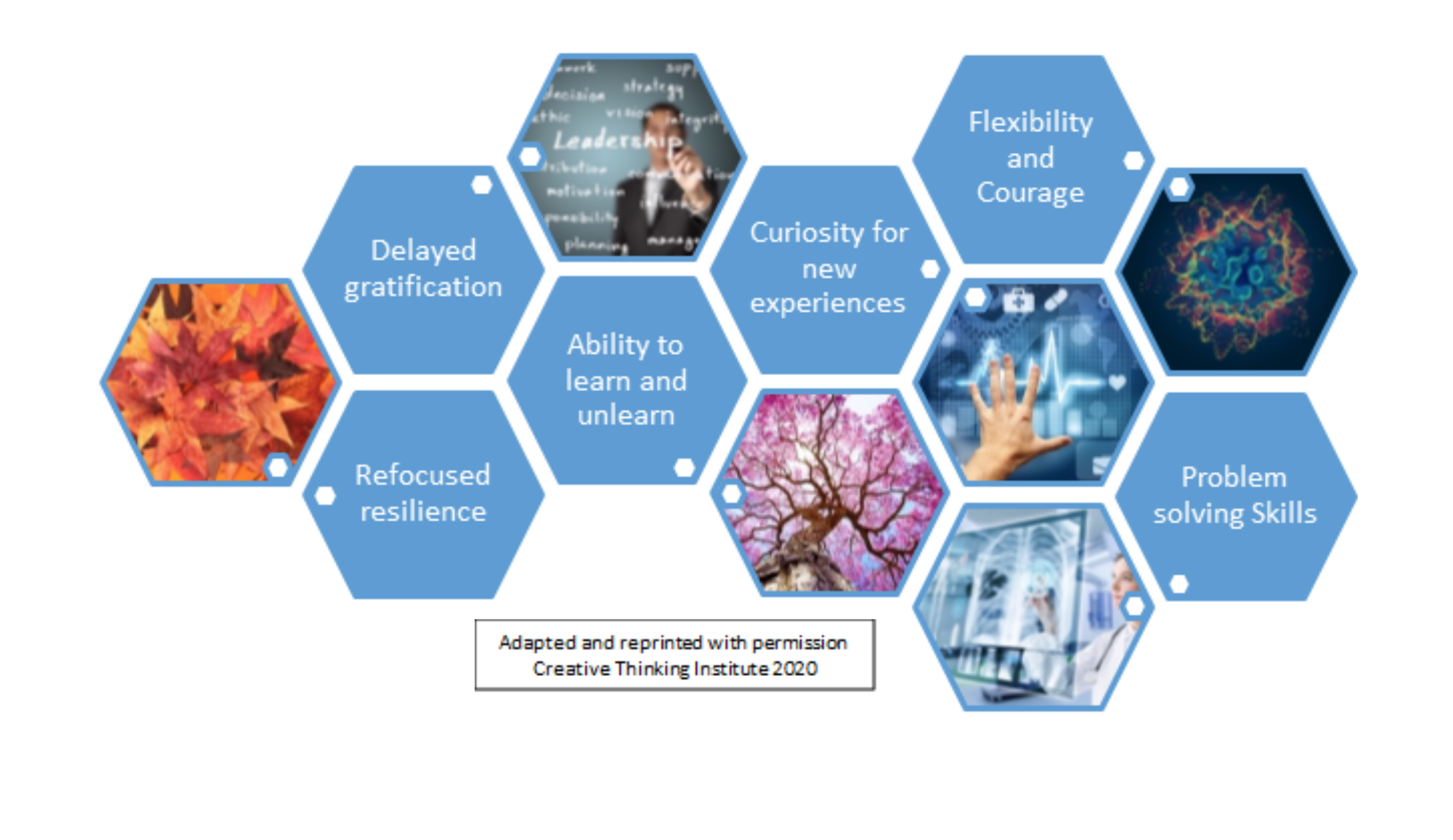Adaptability in this Technological age
There maybe a “new kid” in town, a new meaning to examine, and a new concept to explore. That is the Adaptability Intelligence quotient: AQ.
Something which is increasingly part of the improved understanding on how to navigate this complex world we inhabit. This metric defines the ability to tolerate failure, to learn, relearn and unlearn, to demonstrate flexibility and curiosity, to delay personal gratification, to exhibit refocused resilience and to increase one's problem solving skills.

All of the Adaptability attributes have previously been included in various forms under the umbrella of Emotional Intelligence: EQ
Due to the ongoing technological evolution we are all part of in our societies, we contend that these "bubbled out" subgroups may be best re-evaluated under their own metric, that is the Adaptability Intelligence Quotient
In essence, we propose that Adaptability Quotient: AQ is emerging from the EQ sphere as its own separate important group
Indeed, in this ultra-competitive world of Sports, Finance, Media outlets, Legal and Accounting corporations, we continually require teams of employees to be able to adjust, refocus their intent and develop new plans or decisions and new directions, both rapidly and effectively. The new “agility” is needed as a widespread "sporting or corporate adaptability”.
Increasingly Fortune 500 companies are interviewing new employees with a specific eye towards Adaptability, who will be able to adjust the best, adjust course the easiest and take others with them to benefit the company as a whole through times of transition and change?
Who can do all of this with competent, inclusive, empowering leadership skills?
We believe, that while your IQ gets you through your course, and your EQ gets you through your interview and early career success, it is your AQ level which ultimately will determine how far you advance in positions of leadership in your career. This may initially appear to be somewhat artificial, but the reality may be that AQ is becoming an equaly important domain in our world.
Give it some thought. How is your AQ? How is your Team's AQ?
Today’s short learning cycles, require employees to be able to learn, unlearn, and relearn, and most importantly be able to handle failure readily and efficiently- learn then move on.
Our research is looking to take this concept further, examining the correlation of EQ and AQ with changing stress and performance levels. There may be some newly observable associations in the medical and corporate professions during task orientated and general medical, surgical or corporate activities, which objectively relate to one’s intrinsic EQ / AQ ratios. We also believe these concepts readily apply to the sporting world. We have validated our AQ score.
Perhaps the intersection of all quotients AQ/ IQ/EQ is where our true Performance assessment lies(PQ). Getting the most out of a team enviroment (work or sport), requires the combined effects of superior physical ftness, advanced technical efficiencies and the Cognitive / Psychological fitness to perform at the highest desired level.

Adaptive personality attributes would appear to be important to help us perform at a desired improved level. This is for the individual and the Team
The specific aspect of tolerating failure needs to be addressed in our society. Given that this human reality (of intermittent failure) has been in part disregarded due to the intense effects of severe criticism or at times litigation, that can quickly follow adverse outcomes.
Human error, leading to poorer performance in sports or the corprate world are not easily tolerated, by all parties. This is understandable, as standards should always be as high as possible. But in order to combat increasing levels of burnout, there is a need for workers/ participants at all levels to develop their adaptability to real world outcomes.
This appears closely correlated with the requirement for corporate/ sports professionals to learn new techniques, adapt to adverse outcomes, develop refocused resilience against the unexpected and reapply this knowledge in an ever-changing corporate framework
Specifically, two components of stress decompensation, in the form of emotional exhaustion and depersonalisation, as measured by Maslach, may be due in part, to a low Adaptability Quotient: AQ.
As studies have shown, EQ can be partly increased through specific educational interventions, we hypothesise that increases in AQ will also be amenable to carefully crafted educative efforts.
Thus, our hypothesis, which is currently being tested, is that major inroads can be made to improve stress management in Shiftworkers / Physicians / Nurses / Corporate / Sporting leaders through programs specifically aimed at creating improvements in the combined EQ/ AQ interface. Such programs may subsequently improve excessive stress levels and improve performance outcomes through better decision making.
In the past, the term AQ was used to describe the Adversity quotient (=AdvQ). This concept was introduced by P G Stoltz in the 1990’s. He has since written extensively, with great merit, on the subject of corporate resilience and the assessment and improvement of an individual’s ability to respond to adverse events in their career and life in general.
The central aspects relevant in the overall assessment of an Adversity Quotient (AdvQ) have been recently outlined in a carefully constructed article by Li Bingquan et al, in Psychology and Behavioural sciences (2019).
In their assessment of the Adversity Quotient score (AdvQ comparing such with that of work by P. G. Stoltz), and the development of their validated scoring regime, they stated, it is important to assess additional factors that define the subsequent responses after adversity.
They utilised six subcategories to structure their position. These were in the cognitive, behavioural and emotional domains, looking at reactions of an individual to adversity (relating to Chinese college students). This referred to the cognitive understanding and secondary adoption of a positive or negative performance reaction to an adverse event or life situation.
Also specifically assessed were an individuals’ “responsibility” responses, sense of mission, “tenacious” volition and positive goal orientated response to an adversity. These subgroups relate to one’s focus, decision making skills and ability to be self-aware. More aligned to some original EQ attributes. This construction of an Adversity score (AdvQ) in relation to the assessment of Chinese college students does have significant merit.
In our current society, the response to adverse situations or negative life outcomes, is a significant differentiating factor in determining one’s successful negotiation of numerous hurdles in life
At CTI, we are measuring a persons Adaptability to adverse events. The term Adaptability Quotient, AQ, may be more appropriate in describing these essential coping metrics
As such - AQ - as described by CTI, would appear to be more inclusive of the importance of learning and unlearning following a college or university tertiary degree
Also, increasingly recognised in this rapidly progressive technological age, is that the time frame of knowledge relevance is shortening to 4-5 years (from 10 yrs)
When referring to stress management / burnout prevention in the medical / corporate professional cohort, there has also been a reaction to the overly frequent use of the term resilience. Do we need to completely avoid any implied suggestion of weakness or lack of fortitude?
What is relevant here, is that we need to step back and incorporate a wider lens view of the sphere of AQ. Resilience is very important in handling failure or unexpected adverse outcomes but has in part been over-emphasised as the only concept at play.
We perhaps need to see Resilience, as one attribute of the overall dynamic and its importance needs to be refocused in the wider setting of the Adaptability subset and all other AQ concepts.
Studies in the UK reveal that medical students, start off their training as some of the most resilient tertiary students ever tested. But this can decrease over the subsequent years of their medical training. This is an active area of current research and needs to be tackled in a concerted manner. Why are they becoming less resilient over time and how can this be averted? Perhaps one reason is the specific training focus on the prevention of failure or bad decisions.
Does this in some way contribute to avoidance type reactive behaviours rather than a more balanced realisation and acceptance of all of one’s own limitations in skill/ output/ performance?
Emphasising the need to assist in:
- Ongoing structured mentoring and modelling leadership from peers
- Guidance and coaching, training to specifically inprove one's EQ and AQ.
- Embracing the desired ability to learn and unlearn- this is part of being a life long learner
- Teching how to tolerate and function through episodes of failure
- Being curious, being open, remaining flexible to change
Whilst, recent research has revealed that the best conditions for learning, involve 85-90% of the time making successful decisions and 10-15 % of the time actually experiencing failure. Are we holding workpeople of the sports or corporate arenas to a different less realistic measure?
In summary, it is clear, that those in high positions of leadership in today’s corporate or sports worlds are required to possess and readily demonstrate, a high EQ.
Increasingly, attention needs to also be focussed on the requirements to develop improved AQ in one’s leadership qualities, “en route to the C suite” or similar high managerial /performance levels across other professions or sports.
It is our belief, that attaining a greater leadership career or attaining higher Sporting team outcomes /abilities- specifically depends on having a high individual or Team AQ. We also believe this quotient can be developed and enhanced in the individual or Team.
The combined aspects of a leader with a high EQ and high AQ could create an engaged empathetic leader, prepared to act cohesively- adaptively in the best interests of the organisation / team as a whole.
But particularly, also able to demonstrate this for the individual employee as a specific essential co-member. This could be one of the focal points to training the Physicians / Politicians / Legal practitioners/ Scientists/ Corporate leaders of the future.
We would like to think, undergraduate and post graduate professional training should routinely incorporate the continued education of EQ / AQ qualities in a profession specific environment.
This is the future we could all be aiming for, and this is the future, Creative Thinking Institute wants to help foster and one we aim to be an active contributor in.